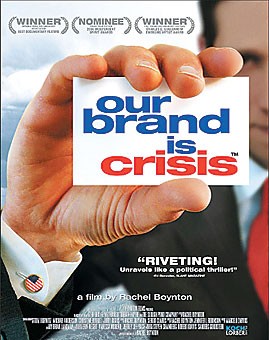In the world of political junkies and history buffs, former President Bill Clinton is the political equivalent of a rock star. Naturally, when someone is hoping to repeat the same amount of success, they recruit the team that helped get Clinton elected.
Struggling Bolivian presidential candidate Gonzalo Sanchez de Lozada (referred to as “”Goni””) hired political strategist James Carville and his firm to help him win the 2003 election. Bolivia is in a state of decay with rampant poverty, corruption and unemployment, and this election could be the turning point to bring the country out of crisis. This documentary follows Carville, Jeremy Rosner and the rest of the consultants from the Greenberg Carville Shrum firm take ideas from American political campaigns and apply them to Goni’s campaign. They meet with focus groups to look at their commercials, spin the local newspapers, send Goni out on photo-ops and even take part in some dirt smearing. Slowly, Goni goes from not even being seriously considered as a major candidate to eking out a victory in the final.
However, winning an election is only half the battle. In the months after winning, Goni ignores the people who got him elected, and Bolivian streets are quickly filled with rioting indigenous people. Despite all of the artful spinning of Rosner and crew, Goni is forced to resign.
Although Goni is the main focus of “”Our Brand Is Crisis,”” the undeniable stars are the political consultants. Each of them brings a vibrant display of passion every time the one-on-one interviews are shown. Many people might not find focus groups or polling numbers all that exciting, so the interviews are used to keep the documentary appealing. Writer, producer and director Rachel Boynton uses the interviews to her advantage to spice up uneventful spans in the film and has a remarkable knack for picking out interesting questions to dialogue on.
In a discussion moderated by the Southern Arizona Society of Professional Journalists after a screening of the film Sunday, panelists and audience members discussed the issue brought up by the film: Can American political styles really be transposed onto other countries?
“”The people (the Bolivians) are not prepared,”” said former U.S. Ambassador and former Arizona Gov. Raul Castro.
Lowdown
“”Our Brand Is Crisis””
Koch Lorber Films
Not Rated, 87mins
7/10
Castro pointed out the naivety of the U.S. political consultants because Bolivia is not typical of South American countries, with a highly indigenous population. Castro said it was hard to believe that they would take to U.S. political standards, considering U.S. acceptability is not very high there.
Audience members also questioned if the film was meant to be a marketing teaser for the firm. Boynton was independent from the firm but had a remarkably deep access. In addition to following every step of the campaign trail, she also splices the footage with interviews of Rosner and Carville on what they think worked and their feelings of responsibility (if any) on the resulting chaos. The film even includes an interview with the displaced president afterwards, who still has trouble getting past his arrogance and admitting his obvious mistakes.
“”Their primary mission was to receive their fee and do their job good enough to get hired elsewhere,”” said UA journalism and Latin American studies professor Alan Weisman who also took part in the panel.
Weisman said Greenberg Carville Shrum was focused on furthering its own business goals, and the film showed how frighteningly successful they were.
“”Elections now really depend on who gets the best PR firm,”” Weisman said.









